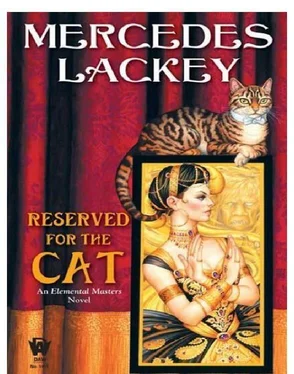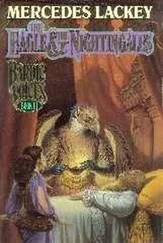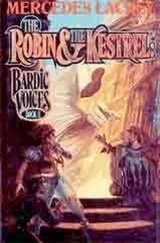There were three gowns in there, but the cat was only interested in the blue velvet one. They were all in rags; it looked as if someone had taken a knife to them and slashed them up.
“The girl works for the most mean-spirited woman I have ever heard of,” the shopkeeper said, shaking his head over the ruins of what had once been a magnificent gown. “Rather than let her maids have her old clothes, because she can’t bear the idea of someone of lower rank than she wearing what she once wore, she slashes the things to rags before throwing them out. The girl brings them here anyway; I generally sell them to the rag and bone man—”
“My great fortune then, that you had not yet,” smiled Ninette as he added that to her purchases. He did them all up in a brown paper parcel, which she carried out, wearing her new clothing and new cloak. The cat led her onwards, back to better neighborhoods, where he directed her purchases of other small items, and then it was time to return to the boarding house for luncheon.
She slipped carefully up the stairs, keeping her parcel hidden as best she could in her cloak. It wouldn’t do for Madame to suspect she had been doing anything other than dutifully visiting the supposed sister. She quickly unwrapped her new things and put them away in her bag, putting the brown paper into the fireplace where it burned nicely. She made very certain that the ruined dress was hidden under the rest of her clothing, and sat for a moment in quiet contemplation of her new “wealth.” Not since she was a little girl had she had a nightdress; she and her mother had simply gone to sleep in their underthings in summer, or fully clothed in the winter when you needed everything to keep warm. She touched the soft linen, the bit of lace, with wondering fingers. And as for the dress and jacket she was wearing, perhaps they were plain by the standards of the woman who had discarded them, but . . . they were scarcely worn. The skirt had never been turned. The hems had not been taken up or let down. There were no patches, no darns, no mended seams. For the very first time in her life, she had an almost-new gown. To be sure, she was very glad it had been gaslit night when she went down to dinner; those girls would have known her for an imposter if they had clearly seen her clothing.
Finally, she closed the bag and left the window open for the cat to come in. Then she went down to the much-diminished group for luncheon.
When she arrived at the table, there were only three other girls here. One of them was a dark-haired, studious-looking girl with very short hair and gold-rimmed spectacles. Madame was not in evidence, but luncheon was. Tea, bread and butter, currant jam, cucumber sandwiches. Clearly there was only one sandwich apiece, but as much bread and butter as a girl would want. The two who were sitting together, still wearing shop-girls’ aprons, gave Ninette a friendly nod, but did not stop their gossip, which was entirely in French. They must have known she could understand them, but since it was inconsequential stuff about other girls in the shop, she ignored them. The dark-haired one was engrossed in a book that did not look at all like a novel; that left Ninette alone with her meal. This, she did not at all mind. Plain as it might be, she savored it, at the same time trying not to let on she was very nearly in transports of joy over the fact that she was eating real butter and a piece of fresh bread she had herself just cut from the loaf, and not salted lard or the grease carefully saved from cooking scraped thin over the top of old, stale bread sold cheap at the corner bakery.
The two girls together—Marie and Jeanne—ate quickly and were as quickly gone; likely their time for luncheon was very short, and allowed only because the English tended to scant luncheon and eat a large tea, which meant they would be there to serve customers at an hour when the other girls would be gone. The bookish girl ate slowly, absently, and methodically, as if she were a steam engine and food was only fuel. Ninette was done before she was, took her plates to the serving hatch as the others had, and left them there.
Then, because she was supposed to be going back to this nonexistent sister, she went out again. The cat went with her, of course. She felt far less conspicuous in her “new” clothing; she no longer looked like the scullery maid, but as if she belonged on this street. Frankly, she had to wonder if Madame would have turned her away if she had spoken English instead of French.
But perhaps the gold sovereign had done the speaking for her.
For some time, she just followed where the cat led. Finally he turned around and looked at her over his shoulder. Where do you want to go? he asked, sounding a bit baffled.
She thought about that. It wasn’t raining, so there was no reason to seek shelter inside a shop or some public building. Finally, after making sure there was no one near enough to hear her talking to a cat, she replied. “Actually, just somewhere we can talk. I want to know just what you plan. I know you are planning something, but I can’t keep living at that house, pretending to visit a sister that does not exist. And are you going to keep stealing purses?”
She stopped then, because someone opened the shop door just behind her. The cat flicked his tail and moved off.
Follow me, was all he said, and so she did.
He led her to a pretty little park, where there were young mothers with toddlers and babies in prams. That is, she assumed that the women were the children’s actual mothers. This neighborhood did not look as if the people living here could afford nursemaids for their children. Like Madame, they probably had a cook and a maid-of-all-work, but looked after their children themselves.
The grisettes of Bohemia and the Left Bank, of Montmartre and garret or basement flats did not have servants at all, and were unburdened with children. Or if they had children, they were left at the door of an orphanage, or the grisette abandoned her Bohemian life to find some way to keep them.
Little ballet girls did not have children either. But that was because, illegal as it was, there were still ways to be rid of a child before it interfered with one’s dancing.
Perhaps that was why the artists had all made a pet of her. She was a rare thing in their lives. They would probably have made even more of a pet of her if she had ever been able to sit still long enough for them to paint her.
The cat found her a relatively secluded bench. There he sat down at her feet—on her feet, actually, and regarded the pigeons with a meditative expression.
I intend to make you an etoile, he said. Here. In the music halls. It will not be like the ballet; they are more like the Follies .
“I should not mind that at all,” she said instantly. “But I don’t see how you are to do that. If they have a steady chorus of dancers, I might rise to be the soloist, but I would never be an etoile. In a place like that, one must have an act, costumes, even scenery sometimes. I have one pair of shoes and one rehearsal costume. And no act.”
Or, he replied, one must have a Name. A Reputation.
She rolled her eyes. “Which I also do not have. As I was told many times, one good review in La Figaro does not a reputation make.”
I did not say we would use your name.
She stared down at him, but he did not meet her eyes. His were fixed on the pigeons. “Whose name, precisely, did you intend to use? And how do you expect me to get away with this impersonation?”
How far from their companies do most dancers ever travel? He countered with a question. Ballet dancers, I mean, and not the sort that have no company, like Isadora and Loie Fuller. You do not want that sort of life. You will need a setting; a theater where you are the resident etoile . Not your own theater, having one’s own theater is foolishness and a waste of money. You need an impresario who will set productions around you, so that you are the etoile of that company. And—more than just ordinary dancers, how many etoiles ever travel?
Читать дальше












